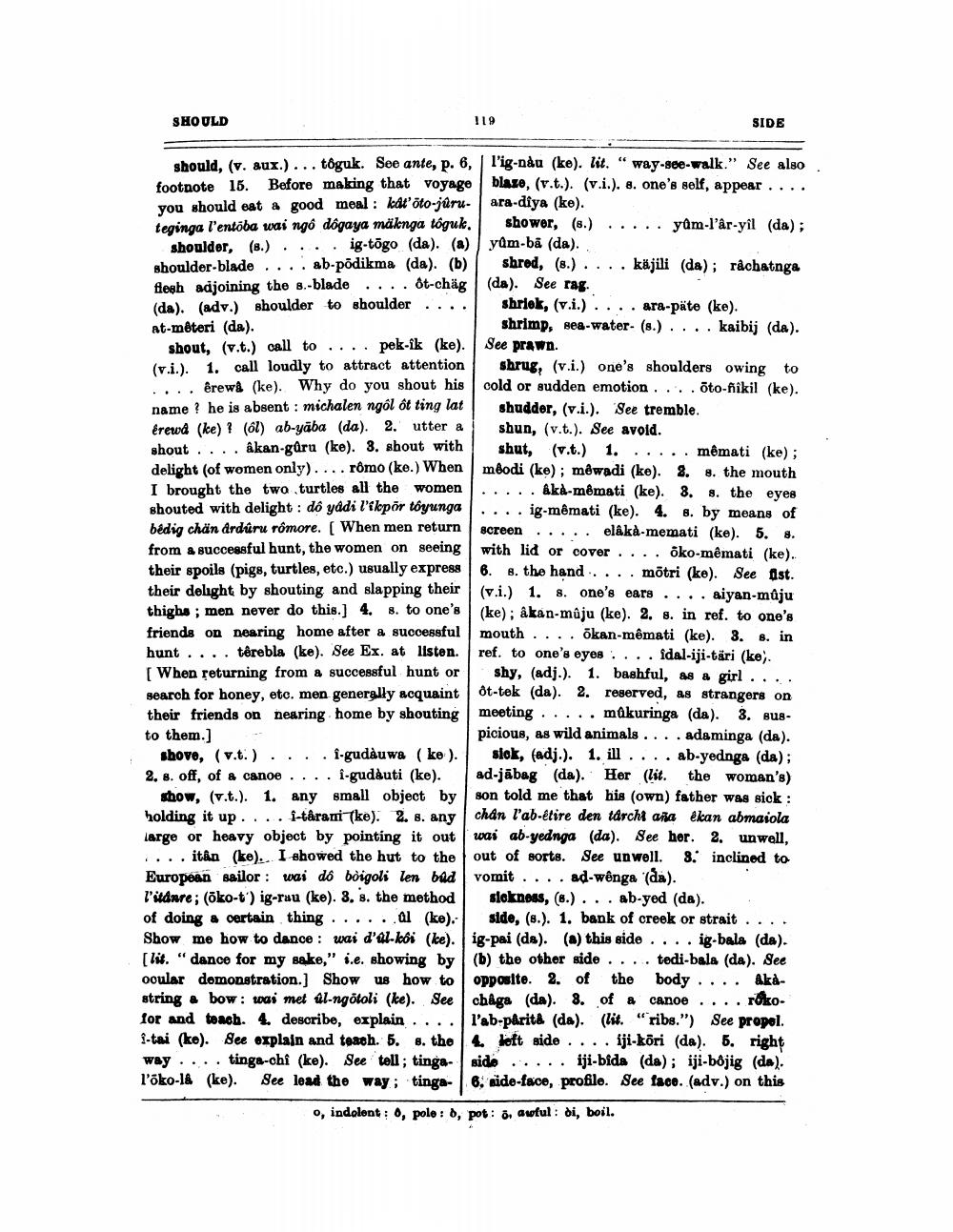________________
SHOULD
êrewa (ke). Why do you shout his name? he is absent: michalen ngôl ôt ting lat érewd (ke) (61) ab-yaba (da). 2. utter a shout... âkan-guru (ke). 3. shout with delight (of women only).... rômo (ke.) When I brought the two turtles all the women shouted with delight: do yadi l'ikpor toyunga bêdig chặn ârdin rômore. ( When men return from a successful hunt, the women on seeing their spoils (pigs, turtles, etc.) usually express their delight by shouting and slapping their thighs; men never do this.] 4. s. to one's friends on nearing home after a successful hunt.... têrebla (ke). See Ex. at listen. [When returning from a successful hunt or search for honey, etc. men generally acquaint their friends on nearing home by shouting to them.]
should, (v. aux.)... tôguk. See ante, p. 6, | l'ig-nàu (ke). lit. footnote 15. Before making that voyage blaze, (v.t.). (v.i.). you should eat a good meal: kat'oto-jûru- ara-diya (ke). teginga l'entoba wai ngô dôgaya mäknga tôguk. shower, (8.) shoulder, (8.) ... ig-tōgo (da). (a) yum-ba (da). shoulder-blade .... ab-põdikma (da). (b) shred, (8.) flesh adjoining the s.-blade.... ôt-chäg (da). See rag. (da). (adv.) shoulder to shoulder shriek, (v.i.) ara-päte (ke). at-mêteri (da). shrimp, sea-water (s.).... kaibij (da). See prawn.
shout, (v.t.) call to... pek-ik (ke). (v.i.). 1. call loudly to attract attention
shove, (v.t.). î-gudàuwa (ke). 2. 8. off, of a canoe... i-gudauti (ke). show, (v.t.). 1. any small object by holding it up.... i-târani (ke). 2. 8. any large or heavy object by pointing it out .... itân (ke). I showed the hut to the European sailor wai dô boigoli len búd l'itdare; (öko-t') ig-rau (ke). 3, s. the method of doing a certain thing... ..al (ke). Show me how to dance: wai d'úl-kôi (ke). [lit. "dance for my sake," i.e. showing by ocular demonstration.] Show us how to string a bow: was met ûl-ngotoli (ke). See for and teach. 4. describe, explain... i-tai (ke). See explain and teach. 5. s. the way tinga-chi (ke). See tell; tingal'ōko-la (ke). See lead the way; tinga
119
.
SIDE
66
way-see-walk." See also s. one's self, appear
o, indolent: 8, pole: ò, pot: o, awful: di, boil.
yam-l'ar-yil (da);
käjili (da); rachatnga
2.
s. the eyes
shrug, (v.i.) one's shoulders owing to cold or sudden emotion....ōto-fîkil (ke). shudder, (v.i.). See tremble. shun, (v.t.). See avoid. shut, (v.t.) 1. mêodi (ke); mêwadi (ke). Akà-mêmati (ke). 3. ig-mêmati (ke). 4. s. by means of elâkà-memati (ke). 5. 8. with lid or cover.... öko-mêmati (ke). 6. 8. the hand... mötri (ke). See ist. (v.i.) 1. s. one's ears. . . . aiyan-mûju (ke); âkan-mûju (ke). 2. s. in ref. to one's mouth... ōkan-mêmati (ke). 3. 8. in ref. to one's eyes. . . . îdal-iji-täri (ke).
screen
shy, (adj.). 1. bashful, as a girl ôt-tek (da). 2. reserved, as strangers on meeting .. múkuringa (da). 3. suspicious, as wild animals.... adaminga (da). sick, (adj.). 1. ill. . . . ab-yednga (da); ad-jābag (da). Her (lit. the woman's) son told me that his (own) father was sick : chân l'ab-êtire den tárcht aña ekan abmaiola wai ab-yednga (da). See her. 2. unwell, out of sorts. See unwell. 8. inclined to vomit.. ad-wênga (da).
mêmati (ke);
8. the mouth
sickness, (6.)... ab-yed (da).
side, (s.). 1. bank of creek or strait ig-pai (da). (a) this side. . . . ig-bala (da). (b) the other side.... tedi-bala (da). See opposite. 2. of the body.... Akȧchaga (da). 3. of a canoe rokol'ab-pârita (da). (lit. "ribs.") See propel. 4. left side. . . . iji-kōri (da). 5. right side iji-bida (da); iji-bôjig (da). 6, side-face, profile. See face. (adv.) on this




